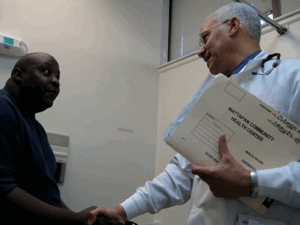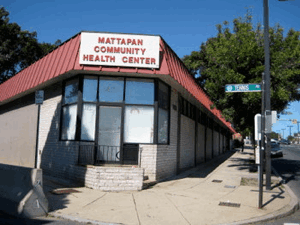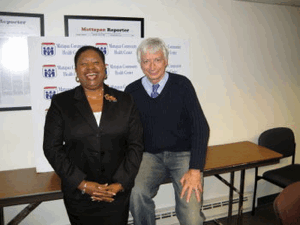Skin Color and Vitamin D
Air Date: Week of August 31, 2012

Samuel Clemens talks with his doctor, Douglass Bibuld, about vitamin D at a recent check up at Mattapan Community Health Center in Boston.
Some 70 percent of Americans are vitamin D deficient. That’s according to the Centers for Disease Control. People get vitamin D from sunshine but those with darker skin need more sun than others. African Americans are more likely to have insufficient amounts of vitamin D than whites, and, as Ashley Ahearn reports, that makes them more likely to get certain types of diseases like cancer and diabetes.
Transcript
GELLERMAN: It’s an encore edition of Living on Earth, I’m Bruce Gellerman. There are a few things you should know about Vitamin D. First - It’s not a vitamin: in the body it acts like a hormone, and it plays a critical role in making bones strong, beefing up the immune system and regulating the growth of cells.
Not having enough Vitamin D may increase your chances of getting certain cancers, osteoporosis, diabetes - even Parkinson’s Disease - and the Centers for Disease Control says 70 percent of us don’t get enough. Vitamin D is called ”the Sunshine Vitamin” because without the sun’s rays, our skin can’t make it: and the darker your skin, the harder it is to get the D you need. Which is why African Americans are twice as likely to have insufficient amounts of vitamin D than whites. This much we know. But, as Living on Earth’s Ashley Ahearn found, there's still a lot left to learn about Vitamin D.
[DOCTORS OFFICE SOUNDS]
BIBULD: Say Aaaahh...
CLEMENS: Aaaahhh.
BIBULD: Deep breath in and out...
[BREATHING SOUNDS]
AHEARN: It's a routine check up at Mattapan Community Health Center in Boston.
[BREATHING IN AND OUT]
AHEARN: Samuel Clemens and his doctor, Douglass Bibuld talk about allergies, sleeping problems, a recent asthma attack – and then Dr. Bibuld turns to the subject of his patient's vitamin D levels.
BIBULD: Below 30 is considered insufficient, below 20 is considered deficient and Mr. Clemens was at eight.
AHEARN: That's eight nanograms per milliliter of blood. Dr. Bibuld wants to get Clemens’ level up to 40, so he has him taking over 7,000 units of Vitamin D per day. That's 17 times more than the government recommends for adults.

Most of the Mattapan Community Health Center's patients are Vitamin-D deficient.
BIBULD: The supplement is taking the place of the sun. If we lived in a place where there was stronger sun, then you would be able to make it in your skin, but since we live in an area where the sun is so weak because you have melanin in your skin, which is a potent sun blocker, we need to replace it with a supplement.
CLEMENS: Oh okay, I never heard it put that way, okay.
AHEARN: It's thought that people evolving in equatorial regions - where the sun's UV rays are the strongest - developed more melanin in their skin for protection.
Dr. Michael Holick is an expert on vitamin D at the Boston University School of Medicine. He says in places where the sun's rays are weaker, people with more melanin are at a disadvantage when it comes to getting the vitamin D they need.
HOLICK: It's like wearing a sunscreen with a sun protection factor of 15 which reduces your ability to make vitamin D in your skin by 99 percent, and that's why most African Americans are at extremely high risk of vitamin D deficiency.
AHEARN: Holick believes vitamin D deficiency may be associated with the higher rate of cancer among African Americans.
HOLICK: Vitamin D helps control cell growth and that's why we think that it will reduce risk of many deadly cancers like prostate, breast, and colon by as much as 50 percent - and African Americans are at much higher risk of having these cancers and we believe that it's in part due to their vitamin D deficiency.

Dr. Azzie Young, president of Mattapan Community Health Center, and Dr. Michael Holick, an expert on Vitamin D at the Boston University School of Medicine.
Holick's research shows that if you're obese you're twice as likely to be deficient in Vitamin D, although researchers don't agree on the mechanism behind this relationship.
We're just beginning to understand the science of vitamin D and the research is sparking some controversy.
Many doctors say light-skinned people need 15 minutes of sun each day to get their vitamin D, but dermatologists are concerned that exposure to sunlight may lead to skin cancer. And Dr. Holick has come under fire for getting five percent of his research funding from a group that represents the indoor tanning industry.
There's not a clear consensus on a recommended dose of vitamin D either. Some experts say that adults of all skin colors should take 1,000 units of vitamin D per day and that some individuals may need more. But the government recommends much less; 200 units of vitamin D per day for newborns to teenagers, 400 for adults, and 600 for people over 70.
Dr. Mary Frances Picciano is a senior research scientist in the Office of Dietary Supplements at the National Institutes of Health.
PICCIANO: We don't have a good history of people taking high doses for long periods of time, so I am very fearful of toxicity with all this enthusiasm, quite frankly.
AHEARN: The National Academy of Sciences plans to reexamine recommended Vitamin D levels by 2010.
[WAITING ROOM SOUNDS FADE UP, CARRIBEAN FRENCH SPOKEN]
AHEARN: Back at Mattapan Community Health Center, a group of Caribbean immigrants sits in the waiting room. By the end of their first winter in Boston, they're just as deficient in Vitamin D as the patients who have lived here all their lives. Dr. Azzie Young is the president of Mattapan Community Health Center.
YOUNG: Mattapan has some of the most serious health problems in Boston, and once we learned that vitamin D deficiency is a major disease for our community we were very concerned about getting everybody on board, making sure that all of our patients have a sufficient level of vitamin D.
AHEARN: But it's not just the patients that are concerned about vitamin D. As an African American, it's on Dr. Young's mind as well.

Samuel Clemens talks with his doctor, Douglass Bibuld, about vitamin D at a recent check up at Mattapan Community Heatlh Center in Boston.
AHEARN: Now Dr. Young takes 3,000 units of vitamin D per day. That's about three times what most vitamin D experts recommend but her levels were so low, that's what it took to bring them up.
YOUNG: I'm over 40.
AHEARN: And do you feel different?
YOUNG: I feel wonderful. I can bounce out of a chair. I can walk without any problems and also I sleep better. It has made a big difference in my life and I've been spreading the word in any kind of way we can.
AHEARN: Dr. Young is working to raise awareness about vitamin D deficiency nation-wide. And research continues on the specific health benefits of vitamin D, but with more evidence that vitamin D deficiency may be associated with diseases like cancer, type II diabetes and Parkinson's, it's clear that people need to take Vitamin D supplements. Just how much we need to take is an open research question.
[WAITING ROOM SOUNDS]
For Living on Earth, I'm Ashley Ahearn in Mattapan, Massachusetts.
Living on Earth wants to hear from you!
Living on Earth
62 Calef Highway, Suite 212
Lee, NH 03861
Telephone: 617-287-4121
E-mail: comments@loe.org
Newsletter [Click here]
Donate to Living on Earth!
Living on Earth is an independent media program and relies entirely on contributions from listeners and institutions supporting public service. Please donate now to preserve an independent environmental voice.
NewsletterLiving on Earth offers a weekly delivery of the show's rundown to your mailbox. Sign up for our newsletter today!
 Sailors For The Sea: Be the change you want to sea.
Sailors For The Sea: Be the change you want to sea.
 The Grantham Foundation for the Protection of the Environment: Committed to protecting and improving the health of the global environment.
The Grantham Foundation for the Protection of the Environment: Committed to protecting and improving the health of the global environment.
 Contribute to Living on Earth and receive, as our gift to you, an archival print of one of Mark Seth Lender's extraordinary wildlife photographs. Follow the link to see Mark's current collection of photographs.
Contribute to Living on Earth and receive, as our gift to you, an archival print of one of Mark Seth Lender's extraordinary wildlife photographs. Follow the link to see Mark's current collection of photographs.
 Buy a signed copy of Mark Seth Lender's book Smeagull the Seagull & support Living on Earth
Buy a signed copy of Mark Seth Lender's book Smeagull the Seagull & support Living on Earth

